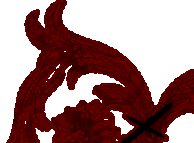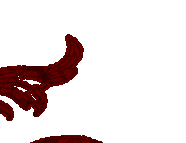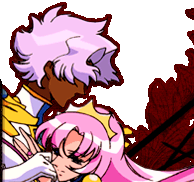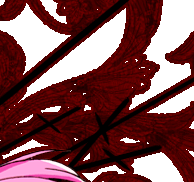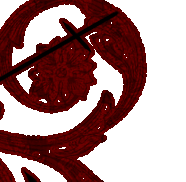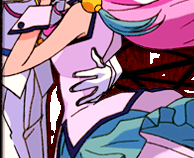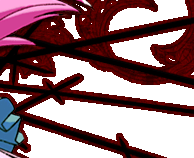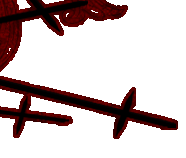
This analysis
was donated by Clarice.  Nanami's Misadventures in Adolescence and Family Matters One of the remarkable things about this series is the forethought shown by the way the series plays itself out. There are many little things shown in earlier episodes that end up saying so much about later developments (and vice versa), and this detail intrigues and delights as much as it also frustrates. This series is so complex that understanding it in its entirety is a vain hope – still, this brief essay hopes to answer what is ostensibly a simple question: what was Nanami’s Egg really all about? Was there a point to any of it? Believe it or not there was, but it is not as simple as all that because the episode doesn’t just reflect on what we know about Nanami already. It is telling us something about what is going to happen to Nanami in future episodes and explains why she reacts the way she does to these events. The egg is a powerful tool in the telling of Nanami’s convoluted story, and this essay seeks to touch upon the surface of its depths. Admittedly, the egg seems to be a fairly straightforward symbolic tool, alluding as it does to the facts of life and growing up – and the difficult passage through adolescence is a key theme of the entire series. In one way or another, the series is all about people not wanting to grow up, and what happens when they are either forced to, or manage to lead themselves to maturity and understanding. In this vein, Nanami’s reaction to the egg is an extreme example of something we have had glimpses of up until this moment – her sheltered upbringing and her lack of basic knowledge. Through conversations with other characters Nanami shows only the haziest understanding of the process of becoming an adult, with the egg forcing her to realise that there is more to the world than she is currently willing to accept. The egg is a symbol of change (and quite possibly of the cycle of death and rebirth), and it demonstrates themes of the series both immediately and in retrospect once the viewer has seen the series through to its bittersweet end. There are several key themes in this episode. One is of adolescence, as is illustrated by the egg and Nanami’s comical misunderstanding of its origins and significance. Two other key themes are abandonment/alienation and reincarnation. These are used for two different reasons and tell us something about two very different characters. The latter refers to Anthy, whereas the former relates once more to Nanami herself. They are then linked by the fact it seems entirely possible that Anthy herself “planted” the egg, though her reasons for doing this are very open to interpretation. Overall, however, this entire situation with the egg is actually reminiscent of the period of adolescence – it is a roller coaster ride of ups and downs that one can not get off from at will. The ride must go on, and the viewer must make some sense of this misadventure for themselves from all the evidence presented them. Though it is not known in this episode, both Nanami and Touga are later revealed to have been adopted by the Kiryuu family. What significance does this have in respect of this particular episode? In short, Nanami has severe abandonment issues that while illustrated aptly throughout most of the series, are particularly obvious here. Note in a later episode Nanami says that she and Touga once did everything together – sleep, eat, bathe; now Nanami ends up doing all of these things with the egg in place of Touga. In it also worth noting that Nanami associates childhood with the happier times she spent with her brother; the brief dream sequence at the beginning of the episode is evidence of this. A young Nanami digs up an egg in a sand-pit and promptly hides it from her curious brother…because she doesn’t want anything to change. She still wants to preserve what existed between herself and her brother as children even though it is obvious from Touga’s present behaviour that it is already completely lost. Despite Nanami’s resistance the changes of adolescence (symbolised partly in that episode by her quiet intrusion on Touga’s shower, where he is blatantly sexualised though Nanami only wishes to recapture the halcyon innocence of childhood) have resulted in Touga out-growing his sister. He pays little attention to her, and when he does he’s patronisingly indulgent, hence why Nanami feels a sense of isolation from the brother that she idolises so. The egg in this episode plays upon Nanami’s need to be accepted and loved by her elder brother, whom she cherishes and holds up as an example of perfection…and as she is his sister, by proxy then Nanami herself must be special too. This is precisely where Nanami’s “big brother complex” comes from, and why it is so important for her to hold onto it at almost any cost. The abandonment issue is a key one in this episode even though it is only more clearly expanded upon in the two later episodes that involve her last duel. Nanami has, throughout the series, held tight to the illusion that her brother belongs to her, and makes her special (it is comparable to Miki’s death grip on the illusion of his sunny childhood garden). When Touga is apparently revealed as not being her brother – and therefore his “specialness” is not also hers by proxy of their shared blood – Nanami’s illusion is shattered. Up until that point, even when Touga ignored her Nanami still felt safe in the knowledge that he could not abandon her because she was his sister. Take that assurance away and Nanami is lost…though she goes about placing the blame for it on other people, such as Utena. It is later shown that even though Nanami will do a lot to keep that love, she won’t do that; her “accidental” walk-in on Akio and Anthy’s intimate moment serves to show what the egg illustrates aptly. Nanami is a child. She does not understand the adult world and her love for her brother is that of a kid sister…even as he grows up and abandons her to travel her difficult passage through adolescence alone, that love does not change. One of the key things we learn early on is that Nanami must always be the centre of attention. Her methods for making herself the centre are usually far from kind or moral, but from her perspective the ends always justify the means. (It’s probably worth noting that Nanami’s unlikely to be genuinely unable to comprehend other people’s pain or the like; she’s simply still very child-like in her self-centredness.) And what is the end result for Nanami? It’s not just the fact that she proves she is better than the “insects” she claims swarm onto her brother. She does it because being “better” makes her worthy of her brother’s attention. It is not only her behaviour that makes her worthy to her brother, however – there is also the matter of the blood ties that seemingly come unstrung when Nanami is led to believe that she is the Kiryuus’ daughter by blood whereas Touga is adopted. Still, what does any of this have to do with her fascination with the painted egg? Nanami is not an affectionate person. This is clear enough from her general behaviour. The only persons she shows any real respect to other than her brother are Miki, Juri, Saionji and Akio, which is most likely because they are at a similar or higher level to what she perceives herself as being on. (This may or may not be true of Saionji; she may simply see him as a friend to her brother and thereby worthy of her attention and/or respect. I’ve always thought it odd Nanami was the only person I can recall ever calling Saionji by his first name alone.) Therefore, Nanami treats most of the people around her as being peons, in a way. Understandably enough this means that she has no real friends, but this doesn’t matter to Nanami as she has her brother to lavish affection upon, and he gives her a brotherly tolerance in return that she can live with. It is only when that tolerance comes with strings that Nanami really begins to fall apart. Nanami’s affection towards Touga is transferred somewhat to the egg in this episode, but only when Nanami believes that the egg is her own and that this is a “normal” occurrence. Originally she has issues of “disgust” over the egg that she has apparently laid, comparing herself to chickens and frogs and lizards (once again, Nanami’s bad karma with animals just gets worse and worse!). Still, she carries it with her and displays barely-veiled distress at the thought of it being broken (illustrated by the amusing exchange with Tsuwabuki and Utena). Once, through some creative selective hearing, she believes firstly that it’s possible for girls to lay eggs (from Miki) and then that it’s normal for ALL girls lay eggs (through Juri, Yuuko, Keiko and Aiko), Nanami begins to show a distinctly maternal side that is rather pleasant to watch. It is a stark contrast to the way she usually treats people, and it is rather sad when one reflects on the misunderstandings that led her to this state. Nanami thinks she laid an egg because she was afraid to ask anyone directly for the truth about it out of fear that they would laugh at her. Even when she believes it to be “normal” she can’t discuss it with anyone simply because she thinks she is a late bloomer and people will make fun of her for it. Naturally enough the only person Nanami attempts to share her happiness with is Touga. The problem with this is, of course, that Touga can mess with his sister’s head without even trying (not that it is particularly difficult to mess with Nanami’s head, as this episode demonstrates!). Touga, through some carefully-worded statements, once again makes Nanami painfully ashamed of having “laid” her egg. Even though Nanami has lavished affection upon the inanimate object and become rather disturbingly close to it, the fear of her brother’s disgust leads her to do something that troubles her deeply. Nanami, who cannot accept the responsibility of having to eat the egg like the other girls apparently do, abandons it instead – this way it won’t make her an embarrassment to her family. (It’s possible that this is a play on the way unwed mothers were formerly viewed, and can still be viewed today. Having this egg brings shame upon her family, and Nanami wishes to keep the illusion of her family intact…because her family is what defines her.) Nanami therefore abandons her egg and runs away from what she has done…in effect, she is a child running away from the responsibilities that becoming a teenager and then an adult bring down upon one’s shoulders. It is not the first time Nanami has done something like this, and it obviously bothers her even when Touga repeats the idea that “good” girls don’t lay eggs. Her conscience finally leads her to the discovery that she cannot bend herself to her brother’s perception of her any longer – even though she must know that Touga will react oddly to her continuing to cart this little painted egg around, Nanami gets out of bed in the middle of the night and runs the streets in her nightgown to where she abandoned her egg. She can’t eat the egg, but she can not leave it alone either; she hovers on the brink of indecision with no-one left to turn to but the egg itself. The reclaiming of the egg is an amusing scene for several reasons. The comedic aspect of the entire situation can not be denied, and this is probably why Saionji finds himself unwittingly involved in Nanami’s histrionics. This is likely to have been done purposely by those who wrote the story; both Nanami and Saionji are all too often the butt of fascinating jokes in this series. Both Touga’s friend and sister are comic relief in several episodes, but this does seem to hint at something important – by the end of the series it is obvious that of all the duellists, Nanami and Saionji are the ones most aware of what is going on. Saionji tries to talk Touga out of his dealings with the chairman, and Nanami warns Utena away from both the chairman and his sister in her heavy-handed type B way. Though Nanami and Saionji are so often held up as foolish characters, they actually end the series with more insight into what happened than the other characters who don’t have such…odd experiences with curry, animals and eggs. At this stage in the series, Nanami has not duelled for the last time – she therefore lacks the experience of Saionji, who has performed his second-to-last duty as a holder of the Seal (he will later act as Touga’s “Bride” and draw his sword for Touga’s last battle with Utena). This is shown well by what Saionji is doing when Nanami finds him. He is camping alone in the woods, apparently frying up some eggs for supper. As this is being done all too close to where Nanami left her egg alone, she understandably starts to feel an overwhelming sense of panic. (And in my opinion, she’d have to be pretty out of her mind to go around trying to sucker punch somebody like Saionji, older brother’s childhood friend or not!) She does reclaim the egg back from Saionji, who apparently has a dish full of the things, and happily skips off with her precious cargo. This scene can be taken as a simple amusing fashion in which to return the egg to Nanami, but note: Saionji is cooking eggs. Eggs have been referred to throughout the series as having shells that need to be broken before the chick inside can be born. This idea will be expanded upon later in this essay, but presently it enough to say this: Saionji can break the eggs, because he understands that “eggs are meant to be eaten.” Saionji is accepting full responsibility for what the breaking of the egg has resulted in, and he does this by cooking and eating said cracked eggs. Nanami recoils at this idea, which Saionji states so evenly. Nanami rejects the responsibility of growing up, and thus rejects again her own path of change (as she did when the boys seemed to demonstrate she should eat the eggs earlier). Note at the end of the episode that the egg cracks all the same, to her horror…leaving her with nothing at all (whether to eat or to nurture!). Simply put, the cooking idea is all about responsibility and change. Nanami wants her egg back, intact – she’s happy to stay a child. Saionji, who has been through more than Nanami at this stage, is moving onward and accepting who he is and what he is becoming. What Nanami is yet to realise when she takes the unbroken egg back from Saionji is that change is inevitable and all rivers will correct their course even when one tries to divert the flow. This links back clearly to the theme of adolescence and unstoppable change, which Nanami still does not understand even as it happens to her. There is also a running theme in this episode of alienation through adolescence. As has been said earlier, Nanami struggles with accepting she laid this egg because it makes her different. Why should this be a problem to Nanami, when in fact her past actions suggests she wants to be different? After all, as the later episodes Her Tragedy and The Romance Of The Dancing Girls indicate, if Nanami does not have her blood tie to her brother, she’s nothing but “one more lowly insect,” the exact kind of “commonplace, boring girl” she’s been trying to stop from “swarming” onto her brother. Really, Nanami found herself to be special only by proxy, the way she only became acting student council president because she was Touga’s little sister. All of her “specialness” is tied up in her brother, and though she wants to be different…she can only be different in the right way. Being different in the wrong way leads to the alienation that Nanami feels in this episode – not an uncommon state for any teenager to be in, particularly one as young as Nanami. She’s thirteen, living on the fine edge between childhood and adolescence, and it seems she has little guidance to rely on through this change. However, in stark contrast to an earlier object that set her apart from the crowd in a way that she perceived as being desirable though it was far from it (the “cowbell of happiness”), Nanami has immediate doubts about the egg to the extent that she believes it makes her different enough that aliens might one day arrive to “take her home!” Oddly enough, she received both of these “gifts” anonymously…but she does believe that she produced the egg herself. She’s ashamed of herself and who she is, and begins to doubt her own worth…all over one little painted egg. Nanami appears to have a self-image problem. She has three loyal minions who compliment her at every turn, and she feels she has to have the best of everything (from the best designers, even) to appear goddess-like. The introduction of the egg to her life leaves her doubting if anything can make her appear special in the way she wishes to be anymore…and it is also tied up with a fear of appearing stupid in front of others she is supposed to be better than, or at least equal to. A good example of this is the fact that she is afraid of her minions proving to have knowledge that she lacks; she is then subsequently disdainful of Tsuwabuki, who naturally has no idea of what Nanami is babbling on about. Nanami makes fun of him to the extent of telling him to fly at Mach 5. Her over-reaction to Tsuwabuki’s “ignorance” is extremely funny and rather typical of her character. Also typical of Nanami is the way she accepts knowledge blindly from others – including Miki and Juri – and runs blindly with it until she hits another wall that makes her think she’s the latest exhibit in a freak show. So, it is easy to say that Nanami wishes to be different – but in an acceptable way. Her earlier cocky self-assurance is very much a front only, and it is obvious how much of her identity is tied up with her brother from this episode. Touga tells her that it is unacceptable to be different like this, and Nanami believes him to the extent that she will abandon the object she believes she is “mother” to. Nanami has to abandon the egg that she has been so uncharacteristically affectionate with because the only other option she can see is to eat the egg, and she can not cope with that idea or the responsibility that comes with the act. (It is perhaps worth a short side note that this is not the first time we have seen Nanami’s softer side. In the episode Mitsuru’s Growing Pains, she demonstrates a kindness towards the confused and angry Tsuwabuki that is rather startling to watch the first time around. It is entirely possible that Nanami understands Tsuwabuki’s desperate need to please her because she experiences a similar thing in her relationship with Touga. Nanami consistently seeks approval from Touga throughout the earlier parts of the series; it is not until after the events surrounding the egg and the adoption that Nanami begins to visibly pull away from her brother’s influence and make her own way in the world. In an interesting coincidence, the Tsuwabuki-centric episode is also about growing up, in much the same way as Nanami’s egg episode is. It’s unlikely that Nanami is consciously aware of how much she and Tsuwabuki have in common in this way, but it’s interesting she empathises with him all the same.) So where does the idea of reincarnation in this episode come from and what relevance does it have? This really relates back to the tangled question of just who sent Nanami the egg in the first place. Touga goads her too cleverly for his knowledge of the egg to be precisely zilch, but it’s unlikely Touga has the resources to pull a stunt like that. It’s doubtful that Akio would find much use in torturing Nanami with an egg (especially considering the way she is forced to duel later on with a much more direct play on her fear of abandonment). The remaining evidence points to Anthy, who incidentally owns a chicken named Nanami as well as being earlier shown to own a cow named the same thing! It may be that perhaps she was priming Nanami for the later events surrounding her final duel. The shadow play in the episode Her Tragedy is an extremely amusing one but seems to have great relevance in that it relates directly back to this episode about the egg. C-ko (the “monkey pretending to be a shadow girl”) makes an interesting return cameo appearance with a story about cuckoos. The story is about parasitism, which echoes back to Nanami’s leeching her “specialness” from Touga. Doing this makes her different to all of the insects she saw swarming all over the bright shining idol she called oniisama. Nanami is obviously the cuckoo; though she is raised in the nest with the other swans she’s not going to become one. The entire point of the shadow play is that the truth is always known to everyone even if they are not consciously aware of it; one can’t hide their true parentage and blood pedigree even when raised another way from birth. This truth is what sets her apart from her brother at last and gives her opportunity to break free and become herself, rather than a shadow of what her brother is, or wishes her to be. It is the twisting of this desire, the seed of which is planted here, that is used to force Nanami to duel later in the series. This does not, however, explain the idea of reincarnation. This idea is brought up in a peculiar night-time conversation between Utena and Anthy that seems at first unrelated to the overall theme of the egg episode. Anthy and Utena talk briefly about how elephants leave the herd to die; Utena suggests it is perhaps because they don’t wish to make the other elephants sad. Her reasoning is a little hard to understand, but it makes some sense if one considers it this way: if the other elephants do not see the death, then they do not have to believe that it happened. They can remain safe in the illusion that perhaps the dead elephant will one day return to the herd, alive and well. Note that during the egg episode Chu Chu disappears without a trace; it is not until he rings the doorbell at the end of the episode that we actually see him again. What does Chu Chu have to do with Nanami’s egg? Quite simply, Anthy’s matter-of-fact reaction to Chu Chu’s disappearance and subsequent return seems to imply that she knows exactly where Chu Chu has been and she accepted his absence as necessary. Chu Chu also does not return home until after Nanami’s egg has broken. The evidence is all circumstantial, but given the hints from Anthy about reincarnation in the episode, it is perhaps not so far-fetched an idea to think that Chu Chu was inside Nanami’s egg. Why would Chu Chu need to do such a thing? It’s unlikely that Anthy would pull so elaborate a hoax for no reason, as it is obvious throughout the series that Anthy has reasons for all that she does. (It would be too complicated to explain Anthy’s means and ends in this essay; it would make a very long essay of its own and thus will not be explored here.) However, Anthy does not seem exactly pleased by the end results. What could this mean? Ohtori seems a place where everything springs eternal; it is implied that Anthy and Akio are immortal creatures who are enslaved to the world they’ve created for themselves. The prince and his sister became the fallen prince and the witch, doomed to repeat their mistakes over and over in the coffin she made for them to both lie in. There is nothing to suggest that Anthy’s familiar is as eternal as his mistress, however. Perhaps Chu Chu needs to be reborn to continue to stay at her side; Anthy’s reasons for having Nanami act as a mother to the rebirth of her own familiar are never made clear but one can always speculate. Was Anthy trying to guide Nanami for whatever reason? Though it is often said that Akio is the puppetmaster of Ohtori, one must recall that it is the Bride who holds the Sword of Dios and therefore seems to hold much of the power inherent in the world around them all. This, of course, does not mean that Anthy is pleased to play witch in this coffin forever. (Notice also what Anthy says about the heart being passed down from the parent to the child as being a form of reincarnation. She is speaking of memories, which bridge the gaps between individuals. This has only slight relevance to this episode, but in fact implies that though Utena will leave the school her memory, no matter how faint, will live on in the lives of those she has changed. This is only relevant in terms of Nanami in that she is experiencing something akin to motherhood for the first time and…makes a rather interesting mess of it.) The last piece of circumstantial evidence that suggests the egg is in fact how Chu Chu stays eternally young comes from those who are always providing interesting commentary on events throughout the series. The shadow play performed by A-ko and B-ko is deeply amusing and deeply perceptive. The basic point is this – the egg is all an illusion. One of the girls tries to balance the egg on chopsticks only to see it topple; she tries again with an act of considerable overkill, announcing that the “impossible is only impossible because you believe it is impossible!” The egg then suddenly deflates and disappears off-screen, leaving only the wry comment: “Apparently, it’s not an egg after all.” Nanami gains an unwelcome parental responsibility for the egg at the beginning of the episode, and through a series of interesting misunderstandings builds a framework with which she can support the existence of the egg without going nuts over it (even though she can’t seem but help to all the same). But still, once she is happy with the egg and its place in her life…it cracks before she was ready for it and whatever was inside this time abandons her. And therefore – Nanami’s egg was never what it seemed to be. What is to stop a viewer from assuming that Chu Chu was the one inside the strange little egg? The egg is a symbol of imprisonment, change, and eventual freedom within the scope of this series; in this episode it is also a symbol of fertility, purity, the beginning of adolescence and the end of childhood innocence. In earlier episodes the ideal of the egg is invoked with the speech of the student council notably the line; “if the chick can not break free of its shell, it will die without ever being born.” (Note also that Nanami, when acting as the proxy student council president, constantly rewords the speech her brother spouted off so often; it suggests perhaps that she never really understood the underlying message of the words.) Nanami is given this egg for reasons that are not so easy to understand. Perhaps it all really did came from Anthy simply needing an “incubator” in order to have Chu Chu returned to her in a new form. (“Ohtori” itself translates as “phoenix” and this peculiar action on Chu Chu’s part can be related back to the way a phoenix dies in flame only to be reborn from the ashes.) Nanami does not fully understand the relevance of the egg in her own life and though it symbolises change, Nanami only takes a few more steps on the path to becoming the chick that must be born from the egg of her childhood self. The change that the egg creates in Nanami in this episode are still obvious; she spends a good chunk of the episode being calm, pleasant and loving to this egg that she is nurturing. The egg makes her more introspective and thoughtful, and more protective of something that is entirely her own. It shatters her to lose the egg at the end of the episode and this is perhaps why the issue of the adoption becomes such an important one in her growth later on. As long as Nanami had the egg, she was defying her brother’s image of herself; when she lost the egg, she was able to be the girl that he thought she was with no evidence of it being otherwise. (One wonders if Nanami ever realised the significance of this given that she has a very distressed reaction to the loss of the egg.) It is not until the evidence of the adoption begins to filter through that Nanami is forced to think further on being a separate person from her brother and defining herself by something other than what he is. Nanami is on a path that separates her from Touga from the beginning of the series; she has been tagging along behind him even as he attempts to leave her in the dust. This debacle of the egg is indeed a part of this slow metamorphosis into a different person, and later changes will follow those found in this episode. The most obvious change to Nanami’s mind is actually shown through the medium of her soul-sword in the episode where she duels last. Note that when Tsuwabuki withdrew Nanami’s soul sword in the Black Rose Arc, he withdrew two swords from her chest. Nanami fought her first duel with these two swords as well – a long, curved sword and a short dagger. Note that in her last duel, where she claims to be fighting to “defeat myself up until now,” Nanami uses only the larger of her swords. Does this imply she is no longer dependant on her brother? It is the two most co-dependant people in the series who use two swords, and Nanami ceases to do so as she separates her identity from her brother. It’s a curious thought and entirely plausible as so much is left open to interpretation in the series; it is also a logical follow on from the events in Nanami’s Egg and the changes that are beginning to become more obvious in her from this point on. Do these changes last? Yes and no; the egg episode is only part of her journey to self-awareness and understanding. Past episodes have also contributed to this – such as the infamous curry high trip and the incident with “Koushi-chan Dior” – and future episodes will shape the woman Nanami is to become in a similar fashion. Nanami is much more obviously subdued after the egg incident, although she does persist in retaining her old patterns of behaviour, even up to the point in the third to last episode where she bossily tells Utena to stop being so naïve. Nanami will always be Nanami, but as she grows and matures she will come into herself. It’s an odd thought and a hopeful one, as Akio himself has pointed out all too clearly that children never become adults in the garden of Ohtori. It suggests that perhaps Nanami will break free of the egg shell that is Ohtori and become the beautiful swan she has always held the potential to be.
 |

